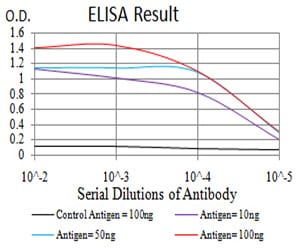

| WB | 咨询技术 | Human,Mouse,Rat |
| IF | 咨询技术 | Human,Mouse,Rat |
| IHC | 咨询技术 | Human,Mouse,Rat |
| ICC | 技术咨询 | Human,Mouse,Rat |
| FCM | 1/200 - 1/400 | Human,Mouse,Rat |
| Elisa | 1/10000 | Human,Mouse,Rat |
| Aliases | JM2; AIID; IPEX; PIDX; XPID; DIETER |
| Entrez GeneID | 50943 |
| clone | 4F12F1 |
| WB Predicted band size | 47.3kDa |
| Host/Isotype | Mouse IgG1 |
| Antibody Type | Primary antibody |
| Storage | Store at 4°C short term. Aliquot and store at -20°C long term. Avoid freeze/thaw cycles. |
| Species Reactivity | Human |
| Immunogen | Purified recombinant fragment of human FOXP3 (AA: 297-431) expressed in E. Coli. |
| Formulation | Purified antibody in PBS with 0.05% sodium azide |
+ +
以下是关于FOXP3抗体的3篇代表性文献,简要概括如下:
1. **"Analysis of FOXP3 protein expression in human CD4+CD25+ regulatory T cells during the course of disease in patients with B-cell chronic lymphocytic leukemia"**
- **作者**:Roncador G, et al.
- **摘要**:该研究评估了多种FOXP3抗体在人类调节性T细胞(Treg)中的特异性,比较了不同抗体在流式细胞术和免疫组织化学中的表现,发现部分抗体存在非特异性结合,需谨慎选择。
2. **"Control of regulatory T cell development by the transcription factor Foxp3"**
- **作者**:Fontenot JD, et al.
- **摘要**:首次克隆小鼠Foxp3基因并证明其是Treg发育和功能的关键调节因子,研究中使用的抗体为后续FOXP3蛋白检测奠定了基础,验证了抗体在小鼠和人类样本中的交叉反应性。
3. **"FOXP3+ regulatory T cells in human cancer: Characterization, disease-specific biomarkers, and clinical implications"**
- **作者**:Wang L, et al.
- **摘要**:系统分析了FOXP3抗体在肿瘤微环境Treg检测中的应用,强调抗体选择需结合组织类型(如福尔马林固定或冰冻切片),并探讨了其在预后评估中的潜在价值。
如需具体实验中的抗体推荐或更多文献细节,可进一步补充说明!
FOXP3. a member of the forkhead box (FOX) transcription factor family, is a critical regulator of immune tolerance. It serves as a master transcription factor for the development and function of regulatory T cells (Tregs), a specialized subset of CD4+ T cells that suppress excessive immune responses and maintain self-tolerance. Mutations in the FOXP3 gene are linked to severe autoimmune disorders like IPEX syndrome (immune dysregulation, polyendocrinopathy, enteropathy, X-linked), underscoring its essential role in immune homeostasis.
FOXP3 antibodies are widely used in research and diagnostics to identify and characterize Tregs. These antibodies target specific epitopes of the FOXP3 protein, enabling detection via techniques such as flow cytometry, immunohistochemistry, or Western blotting. Since FOXP3 is primarily expressed intracellularly in Tregs, its detection often requires cell fixation and permeabilization. However, FOXP3 expression is not exclusive to Tregs; transient expression can occur in activated conventional T cells, necessitating careful interpretation of results.
Clinically, FOXP3 antibodies aid in studying autoimmune diseases, cancer immunology, and transplantation outcomes. Reduced FOXP3+ Treg levels or functionality are associated with autoimmune conditions, while elevated Treg activity in tumors may contribute to immune evasion. Therapeutic strategies targeting FOXP3 pathways, including Treg modulation, are under exploration for cancer immunotherapy and autoimmune therapy. FOXP3 thus remains a pivotal biomarker and potential therapeutic target in immunology.
×